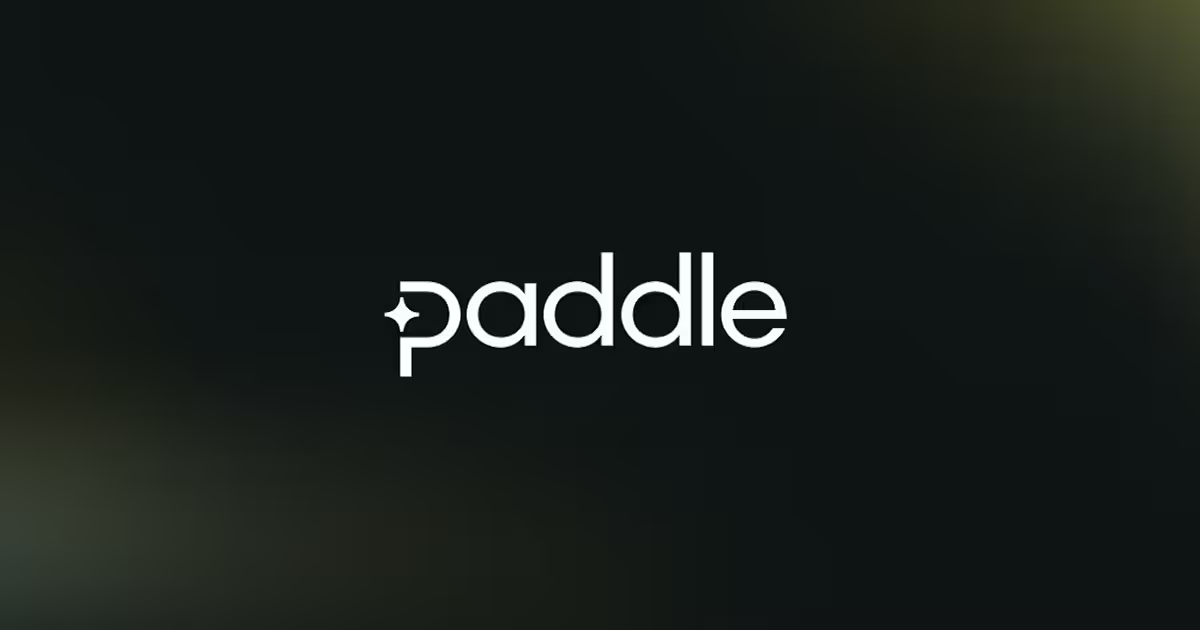Paddle is for independent and SaaS developers. But it’s not a marketplace like; it’s a payment infrastructure…
But how does this platform help freelancers sell? Can every freelancer sell here?
Let's say it from the beginning: it's not for everyone.
What is Paddle?

Paddle is a payment infrastructure that works on the MoR (Merchant of Record) model. It's for freelancers/companies developing SaaS software, and freelancers selling digital products. Today, they have 5000+ active customers.
Many freelancers who want to join ask: "Will it help me make sales?"
Maybe. It depends on what you sell and how.
Let’s first get to know Paddle a bit closer.
Understanding Paddle’s role in digital sales
Paddle isn’t a marketplace. It handles payment, tax, and invoicing processes, reducing risks and operational burdens.
This means:
- Customers won’t come to a Paddle store to buy your product
- People won’t even know you’re using Paddle
- Paddle won’t find customers for you
In short: it’s just a payment infrastructure.
You promote your product via your website and social platforms.
So you still need to:
- Keep positioning your product or service to the right audience
- Have strategies to find your clients
- Build your website or portfolio
- Be active on social media
- Possibly run ads
How does the sales process work?
Step 1: A customer shows interest in your product.
They visit your website, try the demo version, or see your ad on social media. They’re interested and want to buy.
Step 2: Paddle steps in.
When they click the payment button, Paddle takes over.
Paddle:
- Offers credit card, PayPal, and other payment options
- Automatically adds the correct tax based on the customer’s location
- Issues an invoice on your behalf after the purchase
What if your product is subscription-based?
Say you offer a $10/month software. Paddle handles the recurring payment process.
If you offer a free trial, Paddle tracks that for you. No need to worry about cancellations or renewal timing.
If a customer’s card is invalid or payment fails, Paddle prompts them to update their payment info.
Paddle seller fee
You will be charged a fee of 5% + 50 cents per payment transaction.
Can freelancers use Paddle?
Yes, but not for every freelancer.
In fact, it's more ideal if you're an independent developer or entrepreneur offering productized digital solutions.
Paddle if for you if you:
- Develop a SaaS software and offer it with a monthly/yearly subscription
- Have resalable products such as e-books, digital design packages, software plugins, licensed content, etc.
- Want to develop a game/app and sell it with a subscription plan
- Want to sell their software to multiple countries but do not want to deal with details such as tax, VAT, and invoices
However, it’s not for:
- Project-based freelancers (e.g., content writers, designers, consultants)
- Those who offer special pricing on every job and communicate directly with the customer
Because Paddle is focused on a recurring or productized service. It is not for regular and project-based freelancers.
Ruul is a permanent and direct problem-solving tool for independents who offer custom pricing for each job, work on a project/hourly basis, or sell service packages (like 10 blogs per month, weekly Instagram posts).
Why is it ideal for SaaS developers?
Paddle takes care of the hard work of subscription management, auto-renewal, trial period, cancellation, billing, and VAT calculation for you. So you can just focus on developing and marketing the software.
Especially if you want to sell to Europe and VAT is holding you back, you can overcome this.
Benefits of using Paddle for freelancers
We said Paddle is for developer freelancers, but how can it help you when you join? Does it really solve a problem and speed up your work?
Let's talk about the actual features that can be useful.
1. Tax compliance

Paddle manages the tax payment alone. You don't have to work overtime to calculate VAT rates. They record sales tax in more than 100 jurisdictions.
If there is an update to VAT rates in a country (very likely, because regulations tend to change constantly), Paddle will update them too. So you can stay up to date even if you don't know about it.
2. Subscription management

You can create flexible subscription systems. You just need to enter the plan name, custom message, category, billing interval, and trial period.
They also state on their website that they offer more than the classic 3 subscription system.
Let's mention this again: Payments are automatically processed as tax-compliant.
With flexible billing, users can easily cancel their plan, change their plan, or add an additional product to their plan.
3. Localized checkout

Users love payment systems that are localized for them. It increases trust and is an additional layer of motivation to buy.
And here you can customize payments in 30+ currencies and 17+ languages.
4. Fraud protection

Paddle employs a team of professionals who analyze multiple variables. Their goal is to raise awareness and protect sellers against scams.
For example, in one case, your customer has purchased your product and is unfairly demanding a refund. In this case, the professional team works on your behalf to dispute the refund request.
Limitations freelancers should consider
Despite the benefits I just listed, Paddle has a few problems:
Services not allowed: Consulting, coaching and other freelance services are prohibited under Paddle's Acceptable Use Policy.
Strict hiring: Many users report being rejected during the application process. Especially if their business model is not 100% digital products.
If you're offering something outside the boundaries of digital downloads or SaaS, Paddle may not only be unsuitable, it may not let you in at all.
How does Ruul provide a comprehensive solution for freelancers?
Enter: Ruul
Ruul was built with the modern independent in mind. Whether you’re selling a Notion template or a consulting package, Ruul helps you go global.
Here’s how Ruul supports freelancers:
- Sell services and digital products: You’re not limited to just one revenue stream.
- Global compliance and invoicing: Work with clients in over 140 currencies, and Ruul handles the legal side.
- Crypto payouts: Need your money in crypto? You got it.
- Simple onboarding: No stress, no surprises. Just sign up and start selling.
Whether you’re a designer offering branding packages or a coach selling digital workbooks, Ruul supports the entire scope of what you do.
Getting started with Ruul
Getting started is easy:
- Sign up at Ruul’s website–no fees to sign up.
- Set up your freelance profile and list your offerings—whether it’s services, products, or both.
- Start selling globally with built-in tools for invoicing, compliance, and payments.
If you’re tired of fighting payment processors that don’t understand how freelancers work, Ruul is built for you.
Frequently asked questions
Can I use Paddle to sell my freelance services?
No. Paddle does not allow the sale of services like coaching or consulting—only digital products.
What types of products can I sell with Paddle?
You can sell digital items such as software, subscriptions, online courses, and ebooks.
Is Paddle suitable for beginners?
Not always. Paddle’s strict onboarding and rejection of service-based work can make it a challenge for new freelancers.
How does Ruul differ from Paddle?
Ruul supports both services and digital products, handles global compliance, and offers features designed for freelancers.










